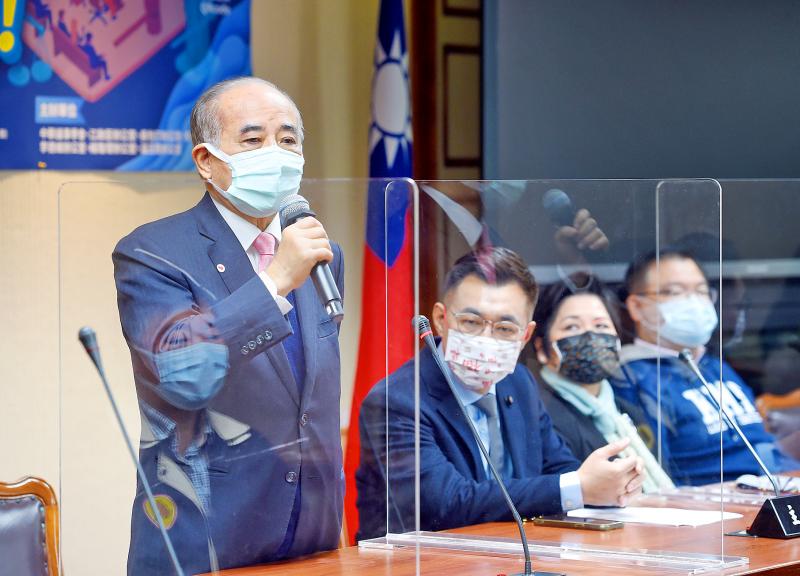Food imports from Fukushima and four other Japanese prefectures that were banned following the 2011 Fukushima Dai-ichi nuclear power plant disaster would eventually be permitted, former legislative speaker Wang Jin-pyng (王金平) said yesterday.
The question now is how to ensure their safety, he added.
Speaking to reporters at the opening ceremony of the fourth annual Congressional Youth Experience Camp organized by the Chinese Nationalist Party (KMT), Wang, a KMT member, said that the issue would be resolved “sooner or later.”

Photo: Fang Pin-chao, Taipei Times
If the agricultural imports that were banned after the disaster are resumed, Japan must first perform stringent inspections, followed by another round after they arrive in Taiwan, he said.
Appropriate equipment and training are necessary to detect traces of radioactive contamination, he said, urging the government to prepare before imports resume.
Separately, KMT caucus whip Alex Fai (費鴻泰) vowed that the caucus would take a stand against any imports of “nuclear food.”
“Health cannot be traded away,” he said, adding that the KMT’s stance is as firm as it was in 2018, when a public referendum seeking to maintain the ban passed by a 78-22 percent vote.
As for a party statement issued on Friday saying the KMT would “not oppose food imports” from the prefectures as long as Japan can guarantee their safety, Fai said it caught the caucus by surprise.
After seeing the news, the caucus immediately conveyed a message to KMT Chairman Eric Chu (朱立倫), who then tasked the party’s Culture and Communications Committee with drafting a statement clarifying its stance.
KMT Legislator and former chairman Johnny Chiang (江啟臣) told reporters that the party’s stance on food safety has never changed, whether the issue is pork containing traces of ractopamine or radioactive contamination.
As the ruling party, the Democratic Progressive Party (DPP) has a duty to explain how food safety is protected, not just change its language or issue an executive order to force clearance of unsafe food, Chiang said.
“We, of course, hope that trade with other countries can be mutually beneficial,” but the government should guarantee food safety, unlike what it did with “ractopamine pork,” when it promised clear labeling, but failed to deliver, he said.
The DPP could potentially use its legislative majority to force the borders open, but failure to block problematic food could spell the beginning of the next disaster, he said.
The government must tell the public of how it decides on food safety standards, its discussions with Tokyo, whether Japan would shoulder any responsibility and who would be held to account if problems arise, he said.
As the Executive Yuan and the DPP have already started discussing the issue, the KMT, as an opposition party, must quickly solidify its stance to perform its supervisory duties well, Chiang added.

A decision to describe a Chinese Ministry of Foreign Affairs statement on Singapore’s Taiwan policy as “erroneous” was made because the city-state has its own “one China policy” and has not followed Beijing’s “one China principle,” Deputy Minister of Foreign Affairs Tien Chung-kwang (田中光) said yesterday. It has been a longstanding practice for the People’s Republic of China (PRC) to speak on other countries’ behalf concerning Taiwan, Tien said. The latest example was a statement issued by the PRC after a meeting between Singaporean Prime Minister Lawrence Wong (黃循財) and Chinese President Xi Jinping (習近平) on the sidelines of the APEC summit

The Taipei Zoo on Saturday said it would pursue legal action against a man who was filmed climbing over a railing to tease and feed spotted hyenas in their enclosure earlier that day. In videos uploaded to social media on Saturday, a man can be seen climbing over a protective railing and approaching a ledge above the zoo’s spotted hyena enclosure, before dropping unidentified objects down to two of the animals. The Taipei Zoo in a statement said the man’s actions were “extremely inappropriate and even illegal.” In addition to monitoring the hyenas’ health, the zoo would collect evidence provided by the public

A road safety advocacy group yesterday called for reforms to the driver licensing and retraining system after a pedestrian was killed and 15 other people were injured in a two-bus collision in Taipei. “Taiwan’s driver’s licenses are among the easiest to obtain in the world, and there is no mandatory retraining system for drivers,” Taiwan Vision Zero Alliance, a group pushing to reduce pedestrian fatalities, said in a news release. Under the regulations, people who have held a standard car driver’s license for two years and have completed a driver training course are eligible to take a test

Taiwan’s passport ranked 34th in the world, with access to 141 visa-free destinations, according to the latest update to the Henley Passport Index released today. The index put together by Henley & Partners ranks 199 passports globally based on the number of destinations holders can access without a visa out of 227, and is updated monthly. The 141 visa-free destinations for Taiwanese passport holders are a slight decrease from last year, when holders had access to 145 destinations. Botswana and Columbia are among the countries that have recently ended visa-free status for Taiwanese after “bowing to pressure from the Chinese government,” the Ministry